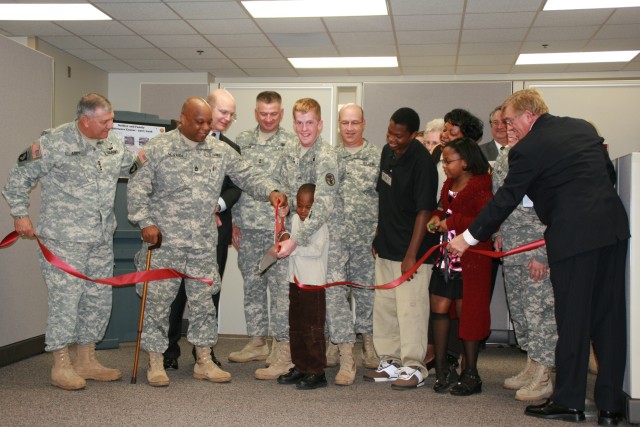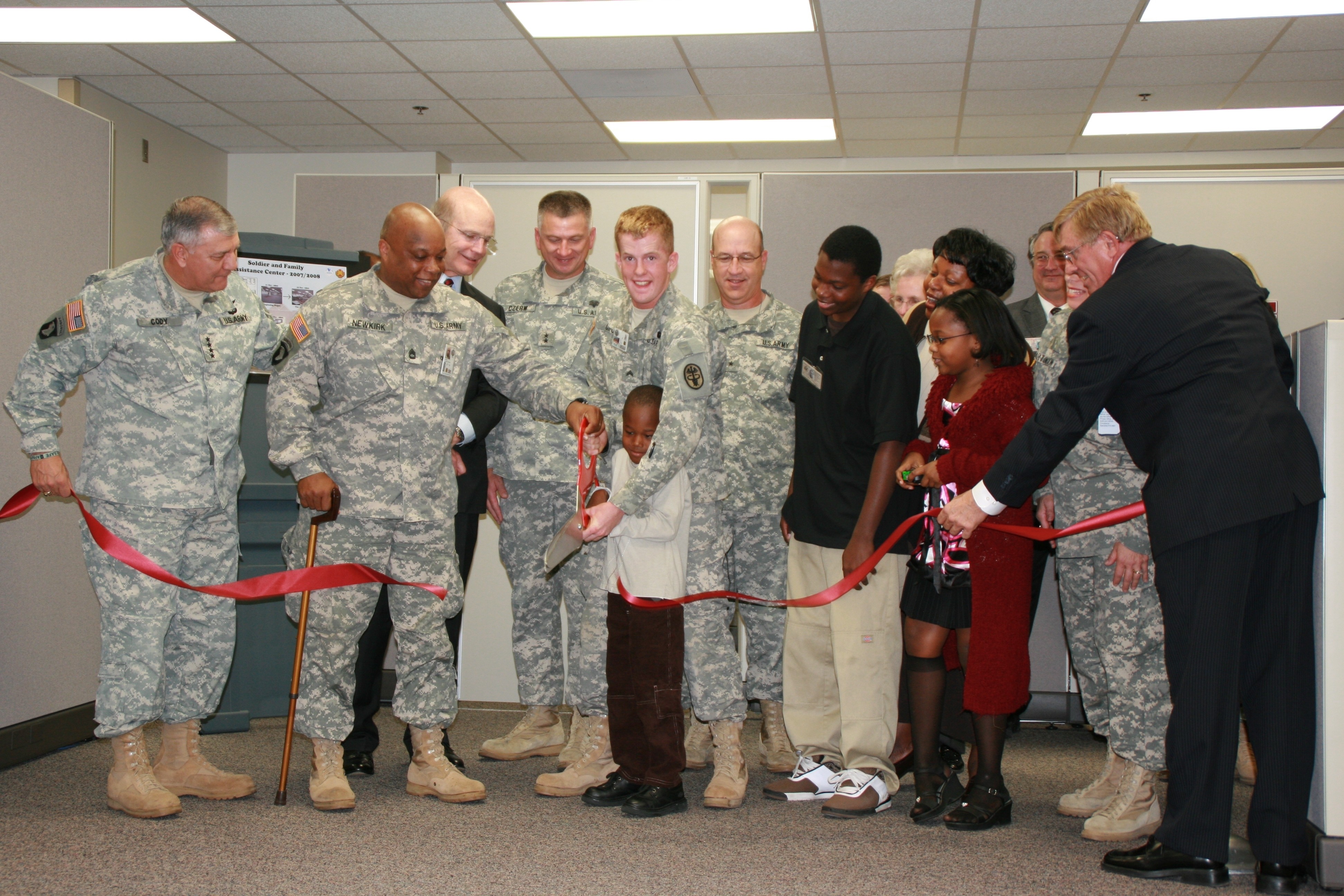
FORT SAM HOUSTON, Texas (Army News Service, Jan. 8, 2008) - The Soldier and Family Assistance Center, a new one-stop support shop for Warriors in Transition and their Families, opened Jan. 2 in the lower level of Brooke Army Medical Center.
The post celebrated the opening with a ceremonial ribbon-cutting at the center Friday, attended by the secretary of the Army and vice chief of staff, as well as post and community leaders.
"We ask so much of our Soldiers, and in turn, those Soldiers who get wounded, we ask even more of their Families," said Army Vice Chief of Staff Gen. Richard A. Cody at the ribbon-cutting. "This SFAC, and the others that we're standing up across our 35 different Warrior Transition Units, is about taking care of our Soldiers and their Families."
Gen. Cody urged the SFAC staff to remember the importance of their job, pledging to allow them the latitude to make decisions. "We trust you to do the right thing."
When it comes to dealing with our young Families and our Soldiers, "don't underestimate the power of you saying, 'don't worry about it, I'll take care of your paperwork, you go upstairs and take care of your Soldier,'" he said.
The SFAC here will serve more than 600 Warriors in Transition. The center comprises more than 20 on-site experts available to offer advice or, in some cases, on-the-spot solutions for everything from pay issues to money management, job hunting to child care. Additionally, the center offers an array of conveniences, to include Internet access, printers, scanners and fax machines.
Most conveniently, the center is located within the hospital, just an elevator ride away for wounded warriors and their Families.
"The goal was to bring services close to Warriors in Transition so they don't have to travel to different locations for information or support," said Charles O'Leary, SFAC supervisor. "The ability to provide a multiservice, one-stop facility for wounded warriors is a demonstration of our commitment to servicemembers and their Families."
Maj. Gen. Russell Czerw, installation commander, described the SFAC as a "hub for orienting" Soldiers on governmental and nongovernmental entitlements, as well as a focal point for administrative and financial needs.
"Our Soldiers deserve the correct guidance and answers the first time they ask that question," he said. "The SFAC staff is committed to making that happen."
The center will enable Soldiers to focus on their new mission, Maj. Gen. Czerw added. "Your mission out there is to heal so that you can come back on active duty or that you can go to your community as a veteran and contribute to your community as you contributed to the nation."
The SFAC marks another step in the Army's quest to improve support services for Warriors in Transition and their Families. Earlier in the year, the Army Medical Action Plan directed the Installation Management Command to establish SFACs on installations in the continental U.S. that have military medical facilities and WTUs.
"Our Army and our Army leadership have realized that ... integral to the Army Medical Action Plan is the implementation of the Soldier and Family Assistance Center," Maj. Gen. Czerw said.
"Abraham Lincoln pledged our nation to take care of those who borne the battle, his widow and his orphan. In all the conflicts since that time, that commitment of our nation has posed different challenges," said Secretary of the Army Pete Geren. "There were times when the system was under great stress and had to respond quickly."
As the Army changes, so does its members' needs, Mr. Geren said. "We're an Army with over half of our Soldiers married and over 700,000 children who are part of Army Families," he said. "As the needs of the Families have changed, as the needs of Soldiers have changed, your Army has to change."
Mr. Geren described the difficulties in implementing change in such a large organization. "It's hard to move a huge organization and make it respond to the needs of individuals and ... make the corrections that it needs to make," said Geren, attributing the credit for many recent changes made to Gen. Cody.
Gen. Cody said it was simply a moral obligation.
"We have a moral obligation in our Army to take care of our Soldiers, our Civilians and our Family members, and that moral obligation is much stronger when we are a nation at war," he said. "I'm very, very proud of what you're doing here, very, very proud of our Army, and I couldn't be prouder of what our Soldiers are doing."
(Elaine Wilson works for the Fort Sam Houston Public Information Office.)

Social Sharing